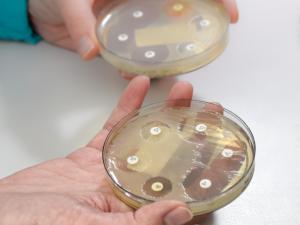Respiratory physician Lutz Beckert considers chronic obstructive pulmonary disease management, including the prevention of COPD, the importance of smoking cessation and pulmonary rehabilitation, and the lifesaving potential of addressing treatable traits. He also discusses the logic of inhaler therapy, moving from single therapy to dual and triple therapy when indicated, as well as other aspects of management
Peer pressure ‘nudge’ reduces GP antibiotic overprescribing, shows study
Peer pressure ‘nudge’ reduces GP antibiotic overprescribing, shows study

“It was really interesting to see that a correctly worded letter influenced behaviour – and it looks like it is probably more effective than public campaigns”
A simple “nudge” letter to GPs pointing out their antibiotic prescribing was “out of whack” compared with their local peers led to a sizeable drop in overprescribing, a study published today finds.
The New Zealand Medical Journal article reports on research carried out by the Health Quality & Safety Commission and Pharmac, in league with the Sydney arm of The Behavioural Insights Team, aka the UK’s Nudge Unit.
The study found that the “nudge” behavioural intervention reduced prescribing for 600 of the country’s highest antibiotic-prescribing GPs. There was a 9.2 per cent fall in the number of their patients prescribed antibiotics, compared with the control group. That equated to 7 per cent fewer scripts.
If the results were extrapolated out to all high-prescribing GPs it would translate to around 48,000 fewer antibiotic scripts over 12 months, say the authors.
One of the authors, HQSC infection prevention and control clinical lead Sally Roberts, says the study focused on GPs as primary care does 90 per cent of the country’s antibiotic prescribing.
The study looked at the 30 per cent of top antibiotic GP prescribers across the 20 DHBs in 2018. In 2019, the resulting list of 1200 GPs were split. Half received the intervention, a letter including a graph showing their prescribing rates in comparison with other GPS in their DHB region, and the other half was the control group.
Dr Roberts says despite national education programmes and best practice guidelines in recent decades, antibiotic prescribing by GPs has remained high.
What was new about the intervention programme was the direct feeding back to individual GPs on how their individual prescribing compared with their peers.
READ MORE:
- The role of susceptibility reporting in antimicrobial stewardship, but what is ‘I’?
- Management of urinary tract infections in children depends on age and history
- A warning against ‘just in case’ antibiotics for UTIs
- Penicillin ‘allergy’ muddies the water and may increase rates of drug resistance and infection
Alex Gyani, one of the authors and Behavioural Insights Team’s Sydney-based director of research and methodology, says the research draws on how social norms and using comparisons with your peers influences behaviour.
“One thing that we really know is that people, broadly, really do pay attention to what happens in their social networks.”
So the research’s “nudge” was to highlight to the GPs that they were high prescribers in a carefully worded letter that was a “call to action” on antimicrobial resistance requiring the GP’s help.
It then put in bold how many antibiotics the GP prescribed compared with x per cent of GPs in their DHB area.
The letter then listed three clear steps for reducing unnecessary prescribing including advising patients on self care, talking to other prescribers in their practice and undertaking a prescribing audit.
Similar “nudge” research on antibiotic prescribing has already been done by the Behavioural Insights Team in the UK and Australia but the New Zealand research also included sending intervention GPs their prescribing statistics for Māori, Pacific and non-Māori and Pacific patients.
“That’s for practices that say, ‘I’ve actually got different demographics so I see sicker patients or I see more Māori and Pacific patients and that’s why I prescribe more antibiotics,’” says Dr Roberts.
Dr Gyani says it also included this prescribing data as they knew that sometimes under prescribing to Māori and Pacific can be an issue – particularly for issues such as rheumatic fever.
“So you don’t want GPs to reduce all prescribing as that can exacerbate health inequities.”
It also noted that there were some GPs in the sample who were over prescribers generally but were on the lower end when it came to prescribing to Māori and Pacific patients.
The results shows that the intervention reduced prescribing to Māori and Pacific patients by previous high prescribers but had not had a statistically significant impact on past low prescribers.
Dr Roberts says a major focus of the research was working on the letter, with a GP advisory group, to ensure the simple messaging was appropriate and not likely to upset people.
Dr Roberts says, since starting the study, follow-up studies of the similar intervention research in the UK and Australia have been published showing that the simple intervention leads to a sustained change in prescribing behaviour.
The pandemic had stopped New Zealand following up its own study but Dr Roberts says the research was an “impressive piece of work” and publication of the results may be the impetus to repeat it next year.
“We are estimating that at some stage, when our borders open up, we are going to have other respiratory viruses, a bit like RSV this winter, come into New Zealand and that may change prescribing practice at that time.
“We are still trying to get the message out that antibiotics don’t work for viruses.”
Dr Roberts says she was aware of social norms in the area of behaviour change but it was the first time she had been involved in research using such interventions.
“It was really interesting to see that a correctly worded letter influenced behaviour – and it looks like it is probably more effective than public campaigns and being talked to about prescribing antibiotics better.
“It was just using social norms and people wanting to be the same as their peers. When they show that they weren’t, it influenced behaviour far more than sitting in a lecture being told what you should prescribe and what you shouldn’t do.”
1. Chappell, N. Gerard, C. Gyani, A. Hamblin, R. McKree, R. Lawrence, A. Mackay, J. Roberts, S. Shuker, C. Te Karu, L. White, J. Using a randomised controlled trial to test the effectiveness of social norms feedback to reduce antibiotic prescribing without increasing inequities. NZ Med J. 134 (1544). 22 October (subscriber only)








![Barbara Fountain, editor of New Zealand Doctor Rata Aotearoa, and Paul Hutchison, GP and senior medical clinician at Tāmaki Health [Image: Simon Maude]](/sites/default/files/styles/thumbnail_cropped_100/public/2025-03/Barbara%20Fountain%2C%20editor%20of%20New%20Zealand%20Doctor%20Rata%20Aotearoa%2C%20and%20Paul%20Hutchison%2C%20GP%20and%20senior%20medical%20clinician%20at%20T%C4%81maki%20Health%20CR%20Simon%20Maude.jpg?itok=-HbQ1EYA)
![Lori Peters, NP and advanced health improvement practitioner at Mahitahi Hauora, and Jasper Nacilla, NP at The Terrace Medical Centre in Wellington [Image: Simon Maude]](/sites/default/files/styles/thumbnail_cropped_100/public/2025-03/2.%20Lori%20Peters%2C%20NP%20and%20advanced%20HIP%20at%20Mahitahi%20Hauora%2C%20and%20Jasper%20Nacilla%2C%20NP%20at%20The%20Terrace%20Medical%20Centre%20in%20Wellington%20CR%20Simon%20Maude.jpg?itok=sUfbsSF1)
![Ministry of Social Development health and disability coordinator Liz Williams, regional health advisors Mary Mojel and Larah Takarangi, and health and disability coordinators Rebecca Staunton and Myint Than Htut [Image: Simon Maude]](/sites/default/files/styles/thumbnail_cropped_100/public/2025-03/3.%20Ministry%20of%20Social%20Development%27s%20Liz%20Williams%2C%20Mary%20Mojel%2C%20Larah%20Takarangi%2C%20Rebecca%20Staunton%20and%20Myint%20Than%20Htut%20CR%20Simon%20Maude.jpg?itok=9ceOujzC)
![Locum GP Helen Fisher, with Te Kuiti Medical Centre NP Bridget Woodney [Image: Simon Maude]](/sites/default/files/styles/thumbnail_cropped_100/public/2025-03/4.%20Locum%20GP%20Helen%20Fisher%2C%20with%20Te%20Kuiti%20Medical%20Centre%20NP%20Bridget%20Woodney%20CR%20Simon%20Maude.jpg?itok=TJeODetm)
![Ruby Faulkner, GPEP2, with David Small, GPEP3 from The Doctors Greenmeadows in Napier [Image: Simon Maude]](/sites/default/files/styles/thumbnail_cropped_100/public/2025-03/5.%20Ruby%20Faulkner%2C%20GPEP2%2C%20with%20David%20Small%2C%20GPEP3%20from%20The%20Doctors%20Greenmeadows%20in%20Napier%20CR%20Simon%20Maude.jpg?itok=B0u4wsIs)
![Rochelle Langton and Libby Thomas, marketing advisors at the Medical Protection Society [Image: Simon Maude]](/sites/default/files/styles/thumbnail_cropped_100/public/2025-03/6.%20Rochelle%20Langton%20and%20Libby%20Thomas%2C%20marketing%20advisors%20at%20the%20Medical%20Protection%20Society%20CR%20Simon%20Maude.jpg?itok=r52_Cf74)
![Specialist GP Lucy Gibberd, medical advisor at MPS, and Zara Bolam, urgent-care specialist at The Nest Health Centre in Inglewood [Image: Simon Maude]](/sites/default/files/styles/thumbnail_cropped_100/public/2025-03/7.%20Specialist%20GP%20Lucy%20Gibberd%2C%20medical%20advisor%20at%20MPS%2C%20and%20Zara%20Bolam%2C%20urgent-care%20specialist%20at%20The%20Nest%20Health%20Centre%20in%20Inglewood%20CR%20Simon%20Maude.jpg?itok=z8eVoBU3)
![Olivia Blackmore and Trudee Sharp, NPs at Gore Health Centre, and Gaylene Hastie, NP at Queenstown Medical Centre [Image: Simon Maude]](/sites/default/files/styles/thumbnail_cropped_100/public/2025-03/8.%20Olivia%20Blackmore%20and%20Trudee%20Sharp%2C%20NPs%20at%20Gore%20Health%20Centre%2C%20and%20Gaylene%20Hastie%2C%20NP%20at%20Queenstown%20Medical%20Centre%20CR%20Simon%20Maude.jpg?itok=Z6u9d0XH)
![Mary Toloa, specialist GP at Porirua and Union Community Health Service in Wellington, Mara Coler, clinical pharmacist at Tū Ora Compass Health, and Bhavna Mistry, specialist GP at Porirua and Union Community Health Service [Image: Simon Maude]](/sites/default/files/styles/thumbnail_cropped_100/public/2025-03/9.%20Mary%20Toloa%2C%20Porirua%20and%20Union%20Community%20Health%20Service%20in%20Wellington%2C%20Mara%20Coler%2C%20T%C5%AB%20Ora%20Compass%20Health%2C%20and%20Bhavna%20Mistry%2C%20PUCHS%20CR%20Simon%20Maude.jpg?itok=kpChr0cc)